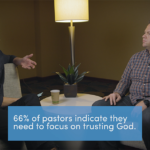
Church leaders often have inner struggles they necessarily keep to themselves. Do any of these issues sound familiar to your ministry?
By Joe McKeever
A pastor I know once confessed to his congregation that he struggled with lust every day of his life. Afterward, he felt relieved and free. Now that they knew, they could pray for him more effectively—right?
But telling his people was a mistake.
Half the women in his church had trouble looking him in the eye, wondering if he was looking at them with impure thoughts. He wasn’t, but it didn’t matter.
The damage was done, and there was no undoing it.
This inner struggle about lust—a very real warfare waged by many a solid Christian—was something he should have kept from the congregation.
In dealing with it, he should have shared it only with the Lord in prayer, his wife, a godly counselor, and maybe a mentor or two who could pray with him.
Church leaders often have inner struggles they necessarily keep to themselves. When I asked a group of ministry friends to name their secret struggles, the list included a wide variety of issues.
1. Personal health or family concerns
How much of my health is church business? What should I tell them? How will they take it?
One pastor told how he and his wife adopted two international children. They thought the church was supportive, until a deacon said to him in private, “Pastor, you should have talked to us before doing that.”
For the rest of his time in that church, the pastor and his wife felt an estrangement from the leadership.
It’s so hard to know what details you should and shouldn’t share with those you lead.
2. Money problems
We’re carrying too heavy a load of debt and may have to take bankruptcy. Or, the church income is not adequate for our needs.
Or, I may have to take an outside job. Is there anyone in the church I can share this with? Will they understand?
3. Unethical behavior of another leader
He or she doesn’t take criticism well. They’re a big contributor and if we lost them, we’d lose their whole extended family. What to do?
4. Contempt from a church member
How should I relate to (and minister to) members who make no secret of their dislike for me, even participating in a movement to oust me?
When they have a crisis—like a death or major illness—I have to call on them and minister to them. But it’s hard.
5. Infringement of ministry on family time
Because of a heavy church load, leaders often miss out on family things. Sundays are especially hard. They often get home in time to get a bite to eat and rest a few minutes before the round of Sunday afternoon/evening meetings begin.
And the family is often not happy with this arrangement.
6. Over-extension to the congregation
Church leaders often wrestle with questions like, Am I allowed to turn my phone off? Can I ever take a vacation and not be called back for a funeral or crisis of some kind? I’ve been asked to coach my son’s Little League team, but it would tie up two evenings a week. What to do?
7. Lack of trusted people
Most of us learn the hard way not to share our secrets too freely.
A young pastor and his wife learn too late that something they confided to a church leader is now known all over town.
I was a new pastor of a large church. In a personnel committee meeting, I asked, “May I share something with this committee in confidence?”
The chairman wisely said, “Pastor, I would not say anything in this room you don’t want known.”
That’s all he had to say. I appreciated the caution.
The Lord’s children receive some help from the Psalmist who had his own secret struggle, this time with the age-old question of, “Why do the wicked prosper and the righteous do rarely?”
His struggle is described in Psalm 73, a favorite of many of God’s people. As the Psalmist toyed with the temptation to go public with his doubt, he paused to worship.
He writes, “Until I went into the sanctuary of God; Then I understood their end” (Psalm 73:17). After God showed him the big reasons why he shouldn’t envy the wicked, he confesses, “thus my heart was grieved, and I was vexed in my mind. I was so foolish and ignorant…” (vs. 21-22).
Some struggles must forever be kept to oneself—or at least not shared outside of a small circle of trusted friends and mentors. Examples of these struggles include:
- Doubts about Scripture
- Questions about key doctrines
- Anger at God
- Home problems
Again, this isn’t to say these things shouldn’t be shared appropriately. We tell the Lord in prayer, our spouse in private, our counselor in his/her office, and our mentor over coffee.
In time, if we are faithful—“we walk by faith, not by sight” (2 Corinthians 5:7)—the Lord may allow us to do as the Psalmist did: to tell about our struggle in order to help those coming behind us.

Joe McKeever
Joe pastored for more than four decades and has been preaching the gospel since 1962. He blogs regularly for pastors and other church leaders at JoeMcKeever.com.











